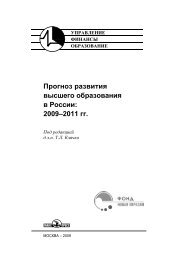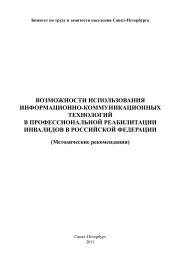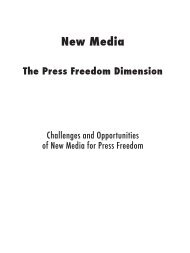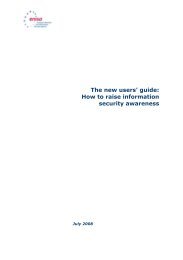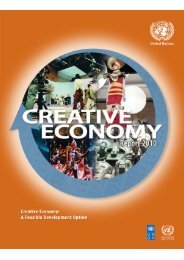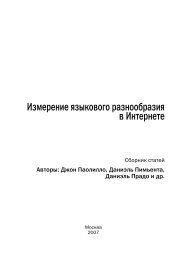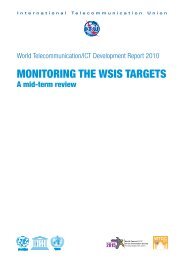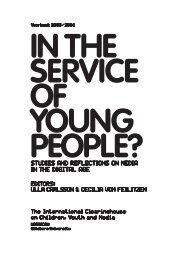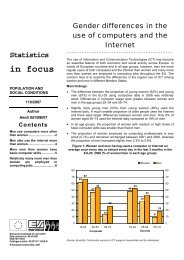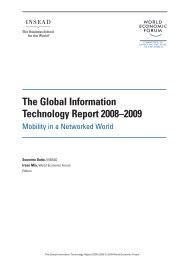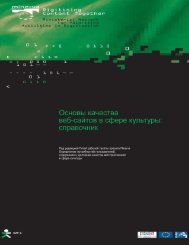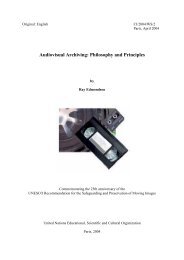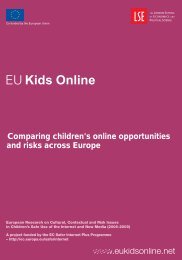study
study
study
You also want an ePaper? Increase the reach of your titles
YUMPU automatically turns print PDFs into web optimized ePapers that Google loves.
maintain and operate it. Urban et al. (2009) point to<br />
online trust as a key factor to the Internet’s success. For<br />
example, lack of trust in ubiquitous technology can significantly<br />
hinder e-commerce. 21<br />
Empirical research about online trust has mainly<br />
focused on e-commerce or the adoption of the Internet<br />
and new technology. Yet many studies, such as Nielsen’s<br />
Global Faces and Networked Places (2009) and the Pew<br />
Research Center’s Generations 2010, indicate that the<br />
Internet is most widely used for e-mail and information<br />
search purposes, as well as social networking activities.<br />
There are relatively few studies related to trust and<br />
these specific Internet uses. Dutton and Sheppard (2006)<br />
examined general trust of the Internet amongst British<br />
users. They asserted that users with greater Internet skills<br />
and years of use normally have more trust in the<br />
Internet. They also suggested that other factors, such as<br />
education, may impact levels of trust. However, as people<br />
become more familiar with the Internet, and begin<br />
to use it more frequently, they also increase their<br />
chances of encountering problems such as spam or<br />
viruses, issues that can undermine online trust. 22 In<br />
addition to years of use and levels of proximity to the<br />
technology, there are other interrelated elements that<br />
affect online levels of trust, such as security. 23<br />
Security<br />
Notions of security have been studied from numerous<br />
perspectives. According to Jenkins-Smith and Herron<br />
(2009), online security is “essentially a contested concept,<br />
associated with contextual meanings that are<br />
extremely broad and variable.” Security concerns can<br />
range widely, from an individual level (such as a person<br />
protecting her computers from viruses) 24 to a national<br />
level (such as agencies monitoring suspicious or terrorist<br />
activities). 25 Although these concepts exist side by side,<br />
and both involve government agencies, technical<br />
experts, and members of the private sector, it is important<br />
to make the distinction between the two. 26<br />
Protective measures adopted for technical or cybersecurity<br />
reasons inevitably have an impact on other concerns<br />
studied, such as freedom of expression or privacy.<br />
Many authors have noted the limiting effects of security<br />
mechanisms over other individual rights and freedoms. 27<br />
A Gallup poll conducted in 2002, only months after the<br />
9/11 attacks, found that the American public was evenly<br />
split about online freedom being reduced by monitoring<br />
practices for national security reasons. 28 There has not<br />
been any substantial follow-up on the subject since.<br />
Often, research focuses instead on digital security<br />
in technical terms, informing the public about trends<br />
in phishing, spam, or malicious code, as the annual<br />
Symantec Global Internet Security Threat Report does. 29<br />
UNISYS also publishes a bi-annual Security Index that<br />
presents social indicators regarding users’ perceptions of<br />
national, financial, Internet, and personal security in 10<br />
different countries. Though the <strong>study</strong> is quite robust, the<br />
definition of Internet security amongst the other types of<br />
security is limited to concerns related to spam, viruses,<br />
and online financial transactions. 30 It fails to recognise<br />
that other types of security threats, such as terrorism,<br />
financial fraud, or identity theft could also belong to this<br />
category, and instead classifies them under categories of<br />
national, financial or personal security.<br />
Thus, the dimensions of online freedom, privacy,<br />
trust, and security are not simple and can overlap, causing<br />
conflicting Internet concerns and values. Cross-cultural<br />
differences and perceptions of these four issues can<br />
further complicate how users worldwide manifest related<br />
attitudes and behaviours. However, the rise of the<br />
global networked society and ubiquitous technology<br />
highlights how important it is to know users’ opinions<br />
and online actions to better understand today’s online<br />
environment.<br />
In order to do this, we have carried out an online<br />
survey to closely examine how Internet users perceive<br />
issues of online freedom of expression, privacy, trust, and<br />
security. What importance do they give to these Internet<br />
values Do attitudes and behaviours vary amongst individuals<br />
from different countries and demographic<br />
groups Are online actions consistent with users’<br />
Internet values<br />
Methodology<br />
Data were collected from 5,400 adult Internet users in<br />
13 different countries through the use of online surveys,<br />
designed by the research team and administered by<br />
comScore. These countries include Australia/New<br />
Zealand, Brazil, Canada, China, France, Germany, Italy,<br />
India, Mexico, South Africa, Spain, the United States,<br />
and the United Kingdom.<br />
Data were collected from October 21, 2010 to<br />
November 19, 2010. Invitations were issued to<br />
comScore panelists by e-mail or through data collection<br />
software that is installed on panellists’ computers in the<br />
form of a web-based pop-up window.<br />
Sampling<br />
The sample for this research <strong>study</strong> targeted the total<br />
online population in each of the targeted countries.<br />
Targeted samples were generated by the system based on<br />
this project’s specific quotas and sampling requirements.<br />
The overall sample was stratified to the quota targets<br />
that were set by comScore and the research team. In<br />
instances where general demographics (age, gender, and<br />
income) in a given quota cell did not reflect the natural<br />
online population, sample weighting was applied.<br />
Questionnaire Design<br />
The questionnaire was developed by combining questions<br />
from numerous previous studies that examined<br />
issues of trust, privacy, security, and freedom of expression<br />
online, as well as questions related to household<br />
The New Internet World<br />
7



